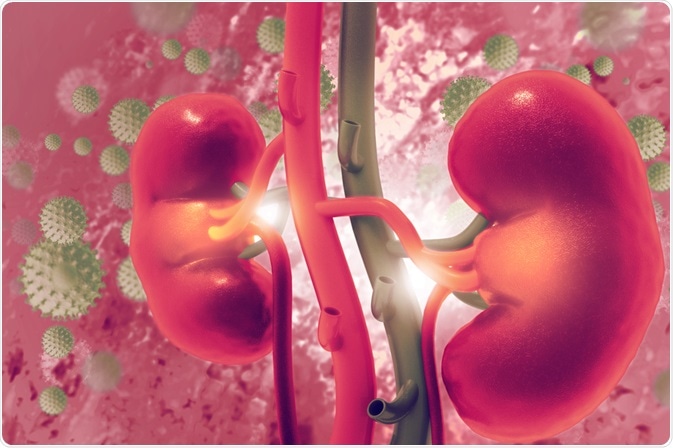Azotemia is a type of nephrotoxicity that involves excess nitrogen compounds in the blood. In severe cases, it has the potential to adversely affect the kidneys and cause acute renal failure.
It is a common condition that is evident in approximately 1% of all hospital admissions in the United States. There is an even higher incidence for patients in hospital at 5%. The frequency of azotemia is highest in people aged between 45 and 64 years.
 Azotemia has the potential to adversely affect the kidneys and cause acute renal failure. Image Credit: crystal light / Shutterstock.com
Azotemia has the potential to adversely affect the kidneys and cause acute renal failure. Image Credit: crystal light / Shutterstock.com
Types of azotemia
There are several different types of azotemia, which are classified according to the area of the renal system that is affected.
Pre-renal azotemia
Pre-renal azotemia is an excess of nitrogen in the blood caused by a lack of blood flow to the kidneys due to prolonged low blood pressure or irregular heart function. This is the most common cause of acute renal failure and can be corrected by returning normal blood flow to the kidneys.
Intra-renal azotemia
Intra-renal azotemia is an excess of nitrogen in the blood caused by damage to the kidneys that affects their function to excrete nitrogen in the urine. There are several medications that may be involved in this kidney damage, including aminoglycoside antibiotics, anti-fungal drugs, chemotherapy agents, biological therapies, ACE inhibitors, IV contrast dues and NSAIDs. Some health conditions can also have an effect such as diabetes and pyelonephritis.
Post-renal azotemia
Post-renal azotemia is an excess of nitrogen in the blood caused by a blockage in the kidneys that prevents the urine from being excreted from the renal system. This may be a result of an obstruction such as a stone, infection, tumor or enlarged prostate gland.
Causes of azotemia
The kidneys constantly filter the blood to excrete waste products and maintain the balance of electrolytes in the bloodstream. When the blood flow to the kidneys decreases, the filtration rate also reduces and, as a result, the waste products build up in the blood and may reach toxic levels.
The build-up of the waste products of nitrogen (e.g. creatinine and urea) is characteristic of azotemia and has the potential to damage organ function. It can be caused by any condition that reduces the blood flow to the kidneys, including heart failure, shock and long-term diarrhea, vomiting, diarrhea or bleeding.
Prerenal acute kidney injury (acute renal failure) - an Osmosis preview
Symptoms of azotemia
The signs and symptoms of azotemia may include:
- Infrequent urination
- Painful urination
- Discoloration of urine (e.g. dark amber or red-tinge)
- Fatigue
- Muscle weakness
- Peripheral edema
- Nausea or vomiting
- Lack of appetite
- Confusion
If there is an associated infection, fever or chills may also be evident.
Diagnosis of azotemia
Blood tests and urinalysis are useful in the diagnosis of azotemia and to monitor the function of the kidneys. This may include the blood urea nitrogen (BUN) test, creatinine test or the 24-hour urine collection test.
Additionally, diagnostic techniques such as ultrasound and x-ray imaging can be useful to visualize the renal system and identify particular issues. A catheter can also be inserted into the urethra to investigate severe or prolonged cases of azotemia further.
Patients who have been diagnosed with azotemia should be aware of their increased risk of kidney damage or failure and take steps to reduce the risk of complications. All healthcare providers should be informed, as several medications and related health conditions may have an effect on the condition.
Management of azotemia
The primary treatment goal is to correct the cause of the imbalance quickly before the kidneys become damaged. Intravenous fluids may be administered to increase blood volume. Several pharmacological treatment techniques may be used to manage certain factors that may have caused the condition. These include:
- Amifostine: to decrease toxicity linked to chemotherapeutic agents
- Antibiotics: to eradicate infection that may have caused azotemia
- Insulin: to regulate blood glucose levels that may have caused azotemia
- Loop diuretics: to excrete excess accumulated fluid in the body
- Sodium polystyrene sulfonates: to decrease potassium concentration in the blood
Additionally, some health practitioners recommend a specific diet for individuals with compromised renal function to promote the healthy function of the kidneys and prevent damage. This may involve:
- Reducing carbohydrate intake to control blood glucose levels
- Monitoring protein intake to 15-20% of total diet
- Increasing vegetable and fiber intake to maintain bowel habits
- Avoiding excess potassium and magnesium
References
Further Reading
Last Updated: Feb 4, 2021